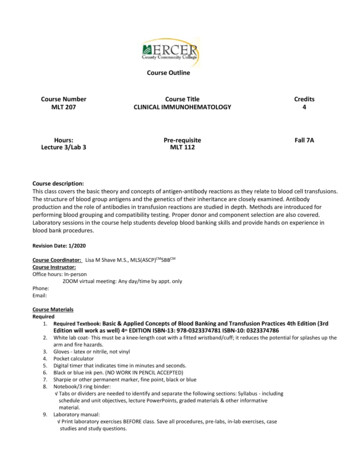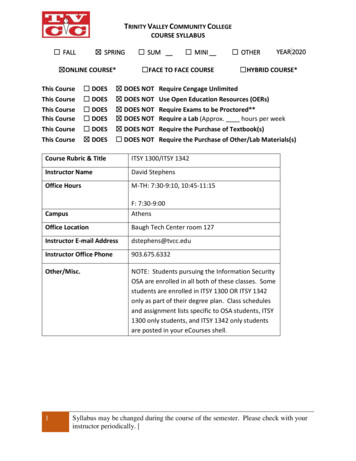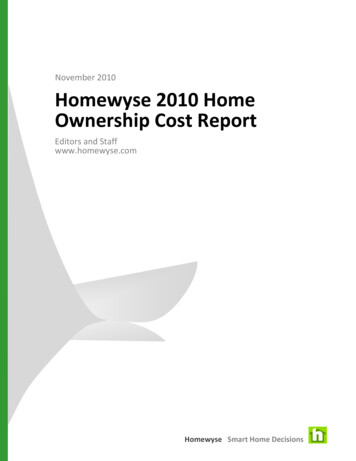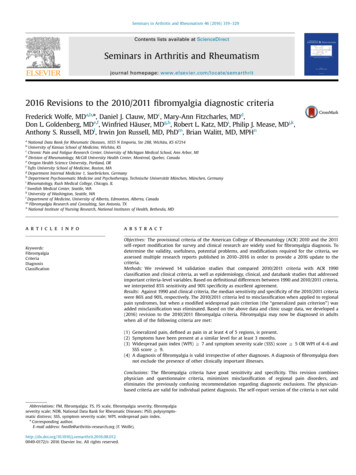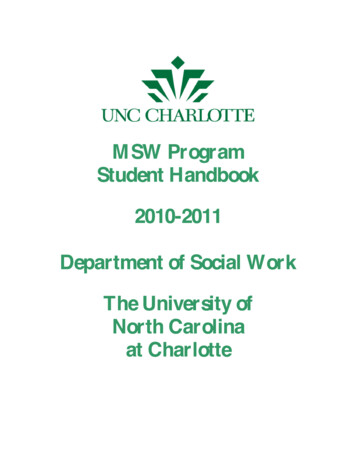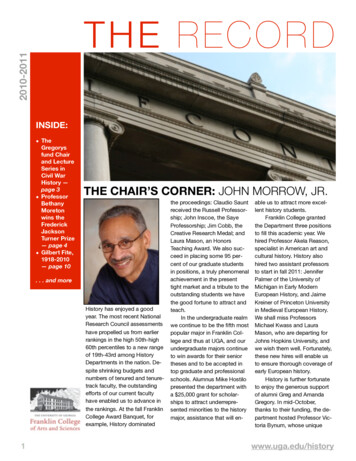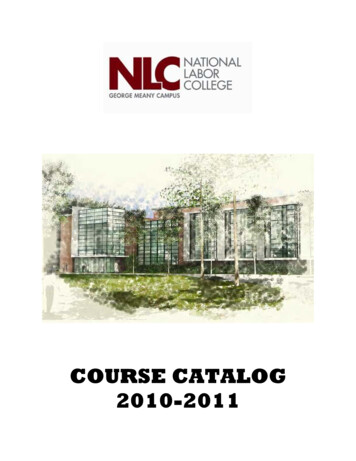
Transcription
COURSE CATALOG2010-2011
TABLE OF CONTENTSMission and Vision StatementAbout the National Labor CollegeMission StatementInstitutional GoalsVision and ValuesNLC Outcomes555556Academic Calendar7National Labor College Degree RequirementsBachelor of Arts – General RequirementsBachelor of Science – General RequirementsNLC School of Professional StudiesSchool of Professional Studies Course DescriptionsNLC School of Labor StudiesBA Majors in the School of Labor Studies ProgramsLabor Studies MajorLabor Education MajorLabor History MajorPolitical Economy of Labor MajorUnion Leadership and Administration MajorLabor Safety and Health MajorGeneral Education Requirements for the BA in the Schoolof Labor StudiesDouble Majors in Labor StudiesSchool of Labor Studies Course Descriptions9999112021222223232324Certificate Programs39AdmissionsPrior Learning Assessment (PLA)Disability ServicesInternational ApplicantsRe-Admittance Policy for Degree StudentsAdvisingTransfer CreditApprenticeship CreditMilitary Training Records RequestCollege Level Examination ProgramSchool of Labor Studies Academic PartnersUnion Partnerships424344444445464747484848Books and Materials5050Registration2526262
Add/Drop/Withdraw and Transcript and Refund PoliciesDeadlines for Adding a ClassDeadlines for Dropping a ClassVoluntary WithdrawalInvoluntary WithdrawalAppealsWithdrawal from the CollegeOnline Participation and Attendance PolicyRelease of Transcript or 656565657Description of GradesGrade AppealsIncomplete GradesMilitary HoldsTransfer CreditCreditAdministrative Hold or Administrative WithdrawalAuditNo GradeLeave of AbsenceRepeated CoursesGPA at GraduationPass/No Credit Grade OptionsSatisfactory Academic Progress PolicyPercentage of Courses CompletedIncomplete Coursework PolicyGrade Point AverageAppeals5858585858Tuition and FeesTuition - School for Labor StudiesTuition - School of Professional StudiesFees - School for Labor StudiesFees – School of Professional StudiesHousing & Meals595959595959Financial AidFederal Financial AidScholarshipsVeterans’ Benefits61616161Graduation PoliciesFiling for GraduationGraduation Deadlines6262623
Commencement Participation63Union Skills Training ProgramUnion Skills Course DescriptionsBuilding and Construction Trades Course Descriptions656673Safety and Health Training ProgramsNational Resource Center for OSHA TrainingRail Workers Hazardous Materials Training ProgramLabor Safety and Health Training Project75757777Educational ProgramsThe Southwest Organizing SchoolKaiser Permanente Health Care InstituteThe NLC—Nigerian Partnership InitiativeNLC Investor Education Project7878787879Graduate Program Opportunities80Academic PoliciesAcademic AmnestyAcademic FreedomPlagiarismAcademic Review Committee and ProcedureOnline Participation and AttendanceNLC Policy on Family Education Rights and Privacy ActDefinition of an Academic RecordAnti-Discrimination and Anti-Harassment Policy and ComplaintProcedureDefinition of Sexual HarassmentElectronic Mail, Internet and Computer Usage PolicyDrug and Alcohol Policy StatementComplaint and Investigation Procedure8282828283858587Administration, Faculty & Staff96Directions to NLC103Campus Map104Important Links10587889194944
MISSION AND VISION STATEMENTAbout the National Labor CollegeThe National Labor College (NLC) is one of a kind, the only college in the United States with anexclusive mission to serve the educational needs of the labor movement. It is an activistinstitution made up of students, faculty and alumni who together form a learning communitybased on a common understanding of the world of work and the ecology of the labor movement.The College respects that its student body is made up of experienced, highly skilled workingadults who have multiple commitments to family, job, union and community. In its academicprograms, the NLC honors higher learning that takes place both inside and outside the collegiatecommunity.Mission StatementBy establishing the physical and intellectual space for the labor movement to imagine its future,the mission of the NLC is to make higher education available to workers, to prepare unionmembers, leaders and staff for the challenges of a changing global environment; and to serve as acenter for progressive thought and learning.Institutional GoalsThe NLC works to achieve the following institutional goals, which are guided by our mission,vision and values:1. To articulate and transmit the values of the labor movement to successive generations ofunion members2. To respond to the needs of those in the labor movement for knowledge, skills andattitudes necessary to secure their futures and those of their families3. To incorporate workplace and union learning into degree programs in order to provideefficient and effective pathways to degree completion for workers4. To provide unions and labor-related organizations with members and leaders who arecritical thinkers and skilled communicators5. To work in partnership with unions and other organizations who support the labormovement to provide relevant and collaborative programs that advance the movementVision and ValuesSince its inception in the 19th century, the American labor movement has placed great emphasison education. In 1969 the leaders of this movement founded the George Meany Center, whichbecame the National Labor College, in order to offer the high quality education and trainingprograms necessary to produce a diverse movement of working men and women dedicated to amore equitable and just society.The contemporary labor movement faces the twin challenges of rapid technological change and ahostile political environment, which have together produced a long-term decline in uniondensity. In recognition of these challenges, another critical role of the NLC is to explore labor’soften underappreciated role in the development of a stable middle class in the world’s mostprosperous society and to transmit the values of the movement to all workers, especially youngerpeople who may not know of labor’s essential role in the development of this society.5
The labor movement’s values that are embodied today at the NLC are the same values that firstbrought working people together in a common movement to advance and protect their interestsin the spheres of politics, economics and culture. Among these values are the following: Labor is the source of all wealthThere is honor and dignity in all workWorking people should have equal protection under the law and the freedom to bargaincollectively to advance and protect their interestsEducation is the key to a free and democratic labor movementDemocratic trade unions are essential to economic justice and to a free and democraticsocietyFor working people to fully realize their potential and that of their children, they musthave equal access to high quality education at all levelsLabor arts and culture are an essential part of education, as they provide the labormovement with its soul and spiritNational Labor College OutcomesNLC graduates achieve the following outcomes as a result of their educational experience,rooted, again, in our mission, vision and values:1. Leadership: The ability to reflect upon, share and deconstruct experience with a goal ofimproving personal and organizational leadership practices.2. Critical Thinking: The ability to understand, question, analyze and discuss underlyingassumptions that define a particular position or viewpoint.3. Effective Communication: The ability to clearly communicate, orally and in writing.4. Global Thinking: The ability to understand complexities of the economic, political andsocial environment.5. Information Literacy: The ability to analyze and make intelligent decisions based uponmassive amounts of information, determine the nature and extent of needed information,know where to obtain critical information, and assess the validity of sources.6. Technological Proficiency: The ability to understand and use basic digitalcommunication tools to function effectively in the changing society.6
ACADEMIC CALENDAR2011SPRING TERMJanuary 3January 10January 16January 17February 1February 3February 5-11February 21March 7March 13April 19April 21April 22April 24April 29College Closed for New Year HolidaySpring Semester Begins OnlineLast Day to Add/Drop (15 week semester)College Closed for Martin Luther King HolidayIntent to Graduate form for Spring due to RegistrarChinese New YearSpring Week in ResidenceCollege Closed President’s DaySpring Term B Begins OnlineLast Day to Add/Drop (Term B)PassoverSpring Semester and Term B EndsCollege Closed for Good Friday HolidayEasterGrades due for Spring semester and Term BSUMMER TERMMay 9May 15May 30June 1June 3-6June 24June 31June 25July 4July 5July 10August 19August 26September 1September 5Summer Semester & Term A Begin OnlineLast Day to Add/Drop (15 week semester & Term A)College Closed for Memorial DayIntent to Graduate form for Summer due to RegistrarSummer Week in ResidenceSummer Term A EndsGrades due for Term AGraduation/CommencementCollege Closed for Independence DaySummer Term B Begins OnlineLast Day to Add/Drop (Term B)Summer Semester and Term B EndsGrades due for Summer semester and Term BIntent to Graduate form for Fall due to RegistrarCollege Closed for Labor DayFALL TERMSeptember 6September 11September 29September 30-October 2October 8October 10October 21Fall Semester & Term A Begin OnlineLast Day to Add/Drop (15 week semester & Term A)Rosh HashanahFall Week in ResidenceYom KippurCollege Closed for Columbus DayFall Term A Ends7
October 28October 31November 6November 8November 11November 24 & 25December 16December 21December 22December 23 & 26December 26Week of December 27Grades due for Term AFall Term B Begins OnlineLast Day to Add/Drop (Term B)Election DayCollege Closed for Veteran’s DayCollege Closed for Thanksgiving HolidayFall Semester and Term B EndsHanukkahGrades due for Fall semester and Term BCollege Closed for Christmas HolidayKwanzaaCollege Tentatively Closed – check NLC website for updates8
NATIONAL LABOR COLLEGE DEGREE REQUIREMENTSBachelor of Arts and Bachelor of Science – General RequirementsThe Academic Requirements for the Bachelor of Arts and Bachelor of Science programs are asfollows:To earn the Bachelor of Arts or Bachelor of Science degree, students must complete a total of 120semester credits with a cumulative GPA of at least 2.0 Students may transfer credits from an accredited institution of higher education (regional,national, professional, specialized), from formally assessed (college or American Councilon Education (ACE)) union apprenticeships or training programs, and/or from creditsaccumulated through military training and service. Students may earn up to 30 semester credits through the Prior Learning Assessmentprogram. Students may transfer up to 30 semester credits earned through CLEP testing.Students must have some combination of college credits, military training, or apprenticeshiptraining to enroll. However; 56 credits are required to be matriculated into the School of LaborStudies or the School of Professional Studies programs.School of Professional StudiesBeginning in Spring 2011, the NLC will offer three new programs in the School of ProfessionalStudies: Business Administration (BA)Emergency Readiness and Response Management (BS)Construction Management (BA)9
Students in the School of Professional Studies (SPS) with fewer than 84 semester credits maytake a range of online elective courses with the NLC. These electives are offered in both sevenand fifteen week formats.SPS students must take the final 36 semester credits at the NLC, in addition to other requiredcourses that vary from program to program. Students should consult the NLC website and onlinecatalog for specific degree requirements for each of these programs.General Program Requirementsi. Students take 27 credits in sequence within their SPS major, including a research methodscourse and a capstone project course. SPS courses are fully online, taught in seven weeks,and students take only one course at a time. There are two seven week SPS terms duringeach 15 week semester, and students must register for both seven week courses at thebeginning of each semester.ii. Students take three core courses (9 credits) that form a common general education programwith each SPS major: Digital Learning and [Name of Program] Labor and Work in the United States Labor and Work in the Global EconomyGeneral Education Requirements for the BA/BS in the School of Professional StudiesGeneral education requirements within the SPS are organized in two sets of 15 credits: The first 15 credits require specific general education courses; students must fulfill at leastthree semester credits each in English composition, mathematics, biological and physicalsciences, arts and humanities, and social and behavioral sciences. If students do not havetransfer credits to fulfill these requirements, the NLC offers courses or independent studies inthese areas. Courses taken as part of the 36 credits required for their major may NOT be usedas general education requirements. The second 15 credits are built into the SPS core and major courses to ensure that students gaina comprehensive understanding and ability to apply the College’s six core competencies:leadership, critical thinking, effective communication, global thinking, information literacy,and technological proficiency. The NLC core competencies lay out a philosophy for aprofessional studies degree, creating a mission specific approach to general education, toensure that students gain a broad-based liberal arts education that exposes them to multipleperspectives and dynamic interdisciplinary approaches to thinking.School of Professional StudiesBachelor of Science in Emergency Readiness and Response ManagementThe NLC is the only higher education institution offering a Bachelor of Science degree inEmergency Readiness and Response Management that combines Homeland Security courses –which examine the function, organization and responsibilities of Homeland Security agencies10
and personnel – with courses in labor studies. The program is specifically designed for rank andfile union members in Fire Service, EMS, Law Enforcement, Public Safety, Homeland Securityand other related fields. A broad overview of Homeland Security complements other areas ofstudy including the rise of modern terrorism, domestic terrorism, the Homeland Securityorganization, and labor and civil liberties issues.Program Outcomes Students will learn to plan the management and mitigation of the physical and humanconsequences of natural, technological, biological, civil, and human-caused hazards byintegrating theory with practice. Students will gain insights into private vs. public financial planning, fiscal year budgetingand the bargaining cycle, budgeting and managing grant applications, and strategicfinancial planning. Students will demonstrate leadership and management roles for all phases of significantevents (e.g., natural and human-made disasters, including terrorism). Students will gain insights into legal, financial, and human resources; regulatorystandards; and safety administration. Students will understand the principles of risk management and related applications.Emergency Readiness and Response Management MajorThe Emergency Readiness and Response Management program requires students to complete 36credits – 12 required courses offered sequentially over two years. Prerequisite courserequirements, credit load, and/or course availability may affect a student’s individual progress.Students should consult their Enrollment Coordinator or an academic advisor for individualprogram planning.Admissions Criteria College and/or apprenticeship credits Admissions essayRequired Core Courses (3 credits each)EMGT-4000 Digital Learning for Emergency Readiness and Response ManagementEMGT-4050 Fundamentals of Emergency Readiness and Response ManagementPSLW-4001 Labor and Work in the United StatesEMGT-4100 Disaster Response, Operations and ManagementEMGT-4210 Legal and Ethical Aspects of Emergency Readiness and Response ManagementEMGT-4700 Research Methods for Emergency Readiness and Response ManagementEMGT-4215 Risk ManagementEMGT-4220 Strategic Financial Planning and ManagementEMGT-4230 Leadership: Systems Thinking and Critical Decision MakingEMGT-4240 Emergency PlanningEMGT-4900 Capstone Project in Emergency Readiness and Response ManagementPSLW-4002 Labor and Work in the Global EconomyAdditional Required Courses*Statistics (must be taken prior to Strategic Financial Planning and Management)11
100 – Introduction to the Incident Command System (ICS)200 – ICS Single Resource700 – Introduction to the National Incident Management System (NIMS)800 – National Response Framework*100 – 800 courses offered by the Emergency Management Institute (EMI) are free, onlineElectivesBargaining in the Public SectorBibliography and ResearchEffective LeadershipEthics in Decision MakingLeadership TheoryBioterrorismIndustrial HygieneHazardous Materials in TransportationCounter Terrorism and Intelligence AnalysisPrinciples of StatisticsPrinciples of PsychologyPrinciples of SociologyCore Course DescriptionsDigital Learning for Emergency Readiness and Response ManagementTechnological development has resulted in widespread change in the way information isacquired, manipulated, and analyzed. Every college and university in the world now relies ondigital systems to meet the needs of their students and other stakeholders. Framed in this context,this course answers some of the fundamental questions about the nature of online education andcovers critical competencies that constitute successful learning in the 21st century, includingresearch and writing skills. This course also provides useful information about the NationalLabor College and its organizational resources, and provides a detailed overview of theEmergency Readiness and Response Management major.Fundamentals of Emergency Readiness and Response ManagementThis course provides an introduction to the fundamental principles of emergency readiness andresponse management and provides historical case studies of public safety management. Topicsinclude an introduction to emergency management skills related to planning, response,mitigation, and recovery for all hazards. Students will also explore the roles and responsibilitiesof emergency response and support functions.Labor and Work in the United StatesThis class is designed to provide students with an understanding of issues related to the evolutionof work, worker organizations, and labor management relations in the United States. The coursewill also examine practical aspects of collective bargaining and contract administration in aunionized workplace and related legal and policy debates.Labor and Work in the Global Economy12
This class is designed to provide students with an understanding of global labor issues and howthey affect the U.S. and world economies. The course will include an overview of the debateover international labor rights and standards, and an introduction to comparative labormovements.Disaster Response, Operations and ManagementThis course provides students with an understanding of jurisdictional, regulatory, and consensusstandards applicable to emergency management. In particular, students will examine the rolesand responsibilities of emergency response agencies and functions (i.e., Federal, State, Local,Tribal, OSHA, National Response Framework, and TCL).Emergency PlanningStudents will critically examine case studies of significant events as a way to approach thesubject of situational awareness management. Students will consider the topics of resourcedistribution management and understand the related guidelines. They will also examine planningfor and responding to significant events as identified by Department of Homeland Securi
7 ACADEMIC CALENDAR 2011 SPRING TERM January 3 College Closed for New Year Holiday January 10 Spring Semester Begins


